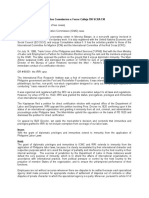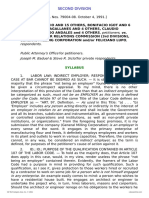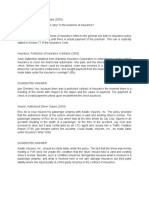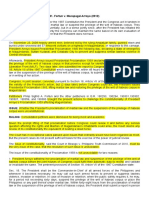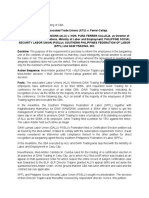100%(2)100% found this document useful (2 votes)
1K viewsDepartment of Foreign Affairs v. NLRC
Department of Foreign Affairs v. NLRC
Uploaded by
Courtney Tirol1) The document discusses a case regarding whether the Asian Development Bank (ADB) had immunity from a legal case filed by a former employee regarding illegal dismissal.
2) The Supreme Court ruled that under the Charter establishing the ADB and Headquarters Agreement between the ADB and Philippines, the ADB and its officials have immunity from legal process, with exceptions for borrowing, guarantees, or securities.
3) The Court also found that the Department of Foreign Affairs (DFA) had standing to file the petition on behalf of the ADB, as the DFA determines diplomatic immunities and ensures compliance with international agreements.
Copyright:
© All Rights Reserved
Available Formats
Download as DOCX, PDF, TXT or read online from Scribd
Department of Foreign Affairs v. NLRC
Department of Foreign Affairs v. NLRC
Uploaded by
Courtney Tirol100%(2)100% found this document useful (2 votes)
1K views3 pages1) The document discusses a case regarding whether the Asian Development Bank (ADB) had immunity from a legal case filed by a former employee regarding illegal dismissal.
2) The Supreme Court ruled that under the Charter establishing the ADB and Headquarters Agreement between the ADB and Philippines, the ADB and its officials have immunity from legal process, with exceptions for borrowing, guarantees, or securities.
3) The Court also found that the Department of Foreign Affairs (DFA) had standing to file the petition on behalf of the ADB, as the DFA determines diplomatic immunities and ensures compliance with international agreements.
Original Title
9. Department of Foreign Affairs v. NLRC
Copyright
© © All Rights Reserved
Available Formats
DOCX, PDF, TXT or read online from Scribd
Share this document
Did you find this document useful?
Is this content inappropriate?
1) The document discusses a case regarding whether the Asian Development Bank (ADB) had immunity from a legal case filed by a former employee regarding illegal dismissal.
2) The Supreme Court ruled that under the Charter establishing the ADB and Headquarters Agreement between the ADB and Philippines, the ADB and its officials have immunity from legal process, with exceptions for borrowing, guarantees, or securities.
3) The Court also found that the Department of Foreign Affairs (DFA) had standing to file the petition on behalf of the ADB, as the DFA determines diplomatic immunities and ensures compliance with international agreements.
Copyright:
© All Rights Reserved
Available Formats
Download as DOCX, PDF, TXT or read online from Scribd
Download as docx, pdf, or txt
100%(2)100% found this document useful (2 votes)
1K views3 pagesDepartment of Foreign Affairs v. NLRC
Department of Foreign Affairs v. NLRC
Uploaded by
Courtney Tirol1) The document discusses a case regarding whether the Asian Development Bank (ADB) had immunity from a legal case filed by a former employee regarding illegal dismissal.
2) The Supreme Court ruled that under the Charter establishing the ADB and Headquarters Agreement between the ADB and Philippines, the ADB and its officials have immunity from legal process, with exceptions for borrowing, guarantees, or securities.
3) The Court also found that the Department of Foreign Affairs (DFA) had standing to file the petition on behalf of the ADB, as the DFA determines diplomatic immunities and ensures compliance with international agreements.
Copyright:
© All Rights Reserved
Available Formats
Download as DOCX, PDF, TXT or read online from Scribd
Download as docx, pdf, or txt
You are on page 1of 3
Tirol
Topic: Employers with immunity from suit
9. Department of Foreign Affairs v. NLRC
DEPARTMENT OF FOREIGN AFFAIRS vs. NATIONAL LABOR RELATIONS COMMISSION,
HON. LABOR ARBITER NIEVES V. DE CASTRO and JOSE C. MAGNAYI
Doctrine: The Charter and the Headquarters Agreement granting these immunities and
privileges are treaty covenants and commitments voluntarily assumed by the Philippines
government which must be respected.
Action Sequence: Labor Arbiter -> NLRC -> SC via petition for certiorari
Facts: On 27 January 1993, private respondent initiated a case for his alleged illegal dismissal
by ADB and the latter's violation of the "labor-only" contracting law. 2 summonses were served,
one sent directly to the ADB and the other through the DFA, both with a copy of the complaint.
ADB and the DFA notified respondent LA that the ADB, as well as its President and Office, were
covered by an immunity from legal process except for borrowings, guaranties or the sale of
securities pursuant to Article 50(1) and Article 55 of the Agreement Establishing the Asian
Development Bank ("Charter") in relation to Section 5 and Section 44 of the Agreement
Between The Bank And The Government Of The Philippines Regarding The Bank's
Headquarters ("Headquarters Agreement").
LA: took cognizance of the complaint on the impression that the ADB had waived its diplomatic
immunity from suit. It ruled that the complainant was a regular employee of respondent ADB,
and the termination of his services was illegal.
The ADB did not appeal. Instead, the DFA referred the matter to the NLRC, seeking
investigation of the LA.
NLRC Chairman replied, stating that if the DFA feels that the action of LA Nieves de Castro
constitutes misconduct, malfeasance or misfeasance, it is suggested that an appropriate
complaint be lodged with the Office of the Ombudsman.
Dissatisfied, the DFA lodged the instant petition for certiorari. The OSG, in its comment, initially
assailed the claim of immunity by the ADB. Subsequently, however, it submitted a Manifestation
stating that it became convinced that ADB, indeed, was correct in invoking its immunity from suit
under the Charter and the Headquarters Agreement.
Issue 1: Whether ADB is correct in invoking its immunity from suit under the Charter and the
Headquarters Agreement.
Ruling 1: YES.
Article 50(1) of the Charter provides:
The Bank shall enjoy immunity from every form of legal process, except in cases arising
out of or in connection with the exercise of its powers to borrow money, to guarantee
obligations, or to buy and sell or underwrite the sale of securities.
Under Article 55 thereof —
All Governors, Directors, alternates, officers and employees of the Bank, including
experts performing missions for the Bank:
(1) shall be immune from legal process with respect of acts performed by them in their
official capacity, except when the Bank waives the immunity.
Like provisions are found in the Headquarters Agreement. Thus, its Section 5 reads:
The Bank shall enjoy immunity from every form of legal process, except in cases arising
out of, or in connection with, the exercise of its powers to borrow money, to guarantee
obligations, or to buy and sell or underwrite the sale of securities.
And, with respect to certain officials of the bank, Section 44 of the agreement states:
Governors, other representatives of Members, Directors, the president, Vice-President
and executive officers as may be agreed upon between the Government and the Bank
shall enjoy, during their stay in the Republic of the Philippines in connection with their
official duties with the Bank:
xxx
(b) Immunity from legal process of every kind in respect of words spoken or written and
all acts done by them in their official capacity.
The above stipulations of both the Charter and Headquarters Agreement should be able, may
well enough, to establish that, except in the specified cases of borrowing and guarantee
operations, as well as the purchase, sale and underwriting of securities, the ADB enjoys
immunity from legal process of every form. The Bank's officers, on their part, enjoy immunity in
respect of all acts performed by them in their official capacity. The Charter and the
Headquarters Agreement granting these immunities and privileges are treaty covenants and
commitments voluntarily assumed by the Philippines government which must be respected.
In World Health Organization vs. Aquino, the Supreme Court declared:
It is a recognized principle of international law and under our system of separation of
powers that diplomatic immunity is essentially a political question and courts should
refuse to look beyond a determination by the executive branch of the government, and
where the plea of diplomatic immunity is recognized and affirmed by the executive
branch of the government, xxx it is then the duty of the courts to accept the claim of
immunity upon appropriate suggestion by the principal law officer of the government.
In the instant case, the filing of the petition by the DFA, in behalf of ADB, is itself an affirmance
of the government's own recognition of ADB's immunity. Contrary to private respondent's
assertion, the claim of immunity is not here being raised for the first time, it has been invoked
before the forum of origin through communications sent by petitioner and the ADB to the LA, as
well as before the NLRC following the rendition of the questioned judgment by the LA, but
evidently to no avail.
Issue 2: Whether the DFA has the legal standing to file the present petition
Ruling 2: YES.
The DFA's function includes, among its other mandates, the determination of persons and
institutions covered by diplomatic immunities, a determination which, when challenge, entitles it
to seek relief from the court so as not to seriously impair the conduct of the country's foreign
relations. The DFA must be allowed to plead its case whenever necessary or advisable to
enable it to help keep the credibility of the Philippine government before the international
community. When international agreements are concluded, the parties thereto are deemed to
have likewise accepted the responsibility of seeing to it that their agreements are duly regarded.
In our country, this task falls principally of the DFA as being the highest executive department
with the competence and authority to so act in this aspect of the international arena.
In Public International Law, when a state or international agency wishes to plead sovereign or
diplomatic immunity in a foreign court, it requests the Foreign Office of the state where it is sued
to convey to the court that said defendant is entitled to immunity. (Holy See vs. Hon. Rosario,
Jr.)
Dispositive: Petition GRANTED.
You might also like
- ConLaw PreWrites 2018 PDFDocument12 pagesConLaw PreWrites 2018 PDFMaria M100% (1)
- Co Kim Chan V Valdez Tan Keh DIGESTDocument3 pagesCo Kim Chan V Valdez Tan Keh DIGESTAids100% (11)
- MIDTERM-EXAMINATIONS-CONSTITUTIONAL-LAW-1 With AnswerDocument12 pagesMIDTERM-EXAMINATIONS-CONSTITUTIONAL-LAW-1 With AnswerLeo Sindol100% (10)
- Abaya v. EbdaneDocument2 pagesAbaya v. EbdaneMaria Analyn0% (1)
- Bayan v. Zamora, GR No. 138570Document3 pagesBayan v. Zamora, GR No. 138570Roward100% (4)
- International Catholic Migration Commission v. Ferrer-Calleja DigestDocument2 pagesInternational Catholic Migration Commission v. Ferrer-Calleja DigestMarion KhoNo ratings yet
- Secretary of Justice Vs Lantion - Case DigestDocument1 pageSecretary of Justice Vs Lantion - Case DigestOM Molins33% (6)
- Bayan Muna V Romulo DigestDocument1 pageBayan Muna V Romulo DigestGracia Sullano100% (1)
- G.R. No. 173034 Pharmaceutical Vs DuqueDocument2 pagesG.R. No. 173034 Pharmaceutical Vs DuqueApoi Faminiano100% (6)
- Vinuya Vs Executive SecretaryDocument1 pageVinuya Vs Executive SecretaryAyban Nabatar100% (3)
- Kuroda vs. Jalandoni (42 OG 4282) Case DigestDocument2 pagesKuroda vs. Jalandoni (42 OG 4282) Case DigestCarlota Nicolas Villaroman89% (9)
- GR No. L-5. September 17, 1945 DigestDocument2 pagesGR No. L-5. September 17, 1945 DigestMaritoni Roxas100% (3)
- USA V Guinto (Case Digest)Document2 pagesUSA V Guinto (Case Digest)haruhime08100% (9)
- SYQUIA V ALMEDA LOPEZ DigestDocument2 pagesSYQUIA V ALMEDA LOPEZ DigestThea Barte100% (4)
- Underhill vs. Hernandez PDFDocument1 pageUnderhill vs. Hernandez PDFEllis Lagasca100% (1)
- Consti2Digest - Liang (Huefeng) Vs People of The Philippines, G.R. No. 125865Document2 pagesConsti2Digest - Liang (Huefeng) Vs People of The Philippines, G.R. No. 125865Lu Cas100% (2)
- The Holy See Vs RosarioDocument1 pageThe Holy See Vs Rosariokjhenyo218502100% (3)
- Republic of Indonesia Vs VinzonDocument2 pagesRepublic of Indonesia Vs VinzonEllis Lagasca100% (2)
- Secretary of Justice V Lantion Case DigestDocument1 pageSecretary of Justice V Lantion Case DigestJan ne100% (2)
- Republic of Indonesia vs. VinzonDocument3 pagesRepublic of Indonesia vs. VinzonRomielyn Macalinao100% (1)
- Vinuya Vs Romula G.R. No. 162230: FactsDocument2 pagesVinuya Vs Romula G.R. No. 162230: FactsA M I R A100% (1)
- Case Digest Pimentel V Executive SecretaryDocument2 pagesCase Digest Pimentel V Executive SecretaryAiza Mercader100% (2)
- Holy See v. Del RosarioDocument2 pagesHoly See v. Del RosarioDan Abania100% (1)
- MIJARES vs. RANADADocument2 pagesMIJARES vs. RANADAStef Ocsalev100% (1)
- Gonzales v. Hechanova, G.R. No. L-21897, 9 Scra 230, 22 October 1963Document2 pagesGonzales v. Hechanova, G.R. No. L-21897, 9 Scra 230, 22 October 1963Pamela Camille Barredo100% (4)
- US Vs Purganan - Hongkong Vs Olalio CASE DIGESTDocument12 pagesUS Vs Purganan - Hongkong Vs Olalio CASE DIGESTFbarrsNo ratings yet
- The Holy See V Rosario JR - DigestDocument2 pagesThe Holy See V Rosario JR - DigestPam Ramos100% (4)
- Fisheries Case UK Vs Norway DigestDocument2 pagesFisheries Case UK Vs Norway DigestCarlyn Belle de Guzman100% (1)
- Hilao vs. Estate of Ferdinand MarcosDocument2 pagesHilao vs. Estate of Ferdinand MarcosCesyl Patricia Ballesteros0% (1)
- Co Kim Chan Vs Tan Keh 75 Phil 113Document1 pageCo Kim Chan Vs Tan Keh 75 Phil 113Jomar Teneza100% (2)
- Dfa v. NLRC DigestDocument1 pageDfa v. NLRC DigestMike E DmNo ratings yet
- World Health Organization vs. AquinoDocument2 pagesWorld Health Organization vs. AquinoCin100% (1)
- US vs. Ruiz, G.R. No. L-35645Document2 pagesUS vs. Ruiz, G.R. No. L-35645Dénise Rafaël100% (8)
- Underhill v. Hernandez (Magsino)Document2 pagesUnderhill v. Hernandez (Magsino)Trxc Magsino100% (1)
- WHO vs. Aquino DigestDocument1 pageWHO vs. Aquino DigestMay Anasco100% (1)
- Santos V Exec Sec MacaraigDocument1 pageSantos V Exec Sec MacaraigSig G. MiNo ratings yet
- Dizon V Phil RyukusDocument1 pageDizon V Phil RyukusMarichelNo ratings yet
- Seafdec v. AcostaDocument1 pageSeafdec v. AcostaMaria AnalynNo ratings yet
- DA v. NLRC DigestDocument2 pagesDA v. NLRC DigestCray Calibre100% (4)
- Bayan Muna vs. RomuloDocument5 pagesBayan Muna vs. RomuloCarlota Nicolas VillaromanNo ratings yet
- LIM Vs Executive SecretaryDocument1 pageLIM Vs Executive SecretaryMan2x SalomonNo ratings yet
- The Asylum Case (Digest)Document2 pagesThe Asylum Case (Digest)Laila Ismael Salisa100% (5)
- Pimentel Jr. Vs Office of The Executive SecretaryDocument2 pagesPimentel Jr. Vs Office of The Executive SecretaryKarez Martin100% (2)
- United States of America vs. GuintoDocument2 pagesUnited States of America vs. GuintoMa Gloria Trinidad Arafol100% (6)
- World Health Organization v. Aquino (48 SCRA 243) : Philippine Government and WHODocument2 pagesWorld Health Organization v. Aquino (48 SCRA 243) : Philippine Government and WHOLe Obm SizzlingNo ratings yet
- 5.4.A.2 PCGG v. Sandiganbayan, 530 SCRA 13Document2 pages5.4.A.2 PCGG v. Sandiganbayan, 530 SCRA 13Abigael Severino100% (2)
- Land Bank vs. AtlantaDocument3 pagesLand Bank vs. AtlantaPrecious AnneNo ratings yet
- Etorma V RaveloDocument2 pagesEtorma V RaveloChap Choy100% (1)
- Seafdec Vs NLRC DigestDocument1 pageSeafdec Vs NLRC Digestabakada_kaye100% (1)
- Zdigest Perio Santos V MacaraigDocument4 pagesZdigest Perio Santos V MacaraigCindy Ann SilvaNo ratings yet
- Case Digest Holy See v. RosarioDocument9 pagesCase Digest Holy See v. RosarioLaw SSC100% (1)
- Consti Case Suzette Nicolas vs. Romulo GR 175888Document2 pagesConsti Case Suzette Nicolas vs. Romulo GR 175888Lu CasNo ratings yet
- 6 Bayan Vs Executive SecretaryDocument2 pages6 Bayan Vs Executive SecretaryRexNo ratings yet
- Translated Lo Ching V. Archbishop of ManilaDocument4 pagesTranslated Lo Ching V. Archbishop of ManilaAlexir MendozaNo ratings yet
- 42 Article II Section 1 Rosas vs. MontorDocument1 page42 Article II Section 1 Rosas vs. MontorRobelle Rizon100% (1)
- 21 Jusmag v. NLRCDocument2 pages21 Jusmag v. NLRCRem Serrano83% (6)
- Pharmaceutical and Health Care Association of The Philippines V Duque IIIDocument4 pagesPharmaceutical and Health Care Association of The Philippines V Duque IIIsabrina gayo100% (1)
- US Vs Reyes Case DigestDocument2 pagesUS Vs Reyes Case DigestSarah BuendiaNo ratings yet
- Bayan Vs Zamora Digested CaseDocument3 pagesBayan Vs Zamora Digested CaseRowell Ian Gana-an100% (1)
- Kuroda v. Jalandoni Case DigestDocument3 pagesKuroda v. Jalandoni Case DigestAljenneth Micaller100% (1)
- Callado vs. International Rice Research InstituteDocument2 pagesCallado vs. International Rice Research InstituteJaime Nikolai100% (1)
- Department of Foreign Affairs vs. National Labor Relations BoardDocument13 pagesDepartment of Foreign Affairs vs. National Labor Relations BoardPaula Bitor100% (1)
- X. Public International LawDocument29 pagesX. Public International LawCourtney TirolNo ratings yet
- VIII. Education, Science, Technology, Arts, Culture and SportsDocument8 pagesVIII. Education, Science, Technology, Arts, Culture and SportsCourtney TirolNo ratings yet
- Pacific Metals v. Edgar TamayoDocument4 pagesPacific Metals v. Edgar TamayoCourtney TirolNo ratings yet
- Consti Law 2 ReviewerDocument16 pagesConsti Law 2 ReviewerCourtney Tirol100% (1)
- Labor Standards Benefits - Remunerations TableDocument8 pagesLabor Standards Benefits - Remunerations TableCourtney TirolNo ratings yet
- Baguio v. NLRC (1991)Document9 pagesBaguio v. NLRC (1991)Courtney TirolNo ratings yet
- Philippine Geothermal, Inc. Employees Union (PGIEU) vs. Chevron Geothermal Phils. Holdings, Inc.Document3 pagesPhilippine Geothermal, Inc. Employees Union (PGIEU) vs. Chevron Geothermal Phils. Holdings, Inc.Courtney TirolNo ratings yet
- VI. Bill of Rights - O To TDocument70 pagesVI. Bill of Rights - O To TCourtney TirolNo ratings yet
- Labor Finals CasesDocument221 pagesLabor Finals CasesCourtney TirolNo ratings yet
- IX. National Economy and PatrimonyDocument31 pagesIX. National Economy and PatrimonyCourtney TirolNo ratings yet
- Alilin v. Petron (2014)Document13 pagesAlilin v. Petron (2014)Courtney TirolNo ratings yet
- Philippine Airlines (PAL) vs. NLRCDocument2 pagesPhilippine Airlines (PAL) vs. NLRCCourtney TirolNo ratings yet
- Caranto vs. Bergesen D.Y. Phils., Inc.Document3 pagesCaranto vs. Bergesen D.Y. Phils., Inc.Courtney TirolNo ratings yet
- Iran V NLRCDocument3 pagesIran V NLRCCourtney TirolNo ratings yet
- PICOP Resources v. de GuilaDocument3 pagesPICOP Resources v. de GuilaCourtney TirolNo ratings yet
- 82 Lagman V Medialdea (2017)Document7 pages82 Lagman V Medialdea (2017)Courtney TirolNo ratings yet
- Diambrang v. COMELEC (2016)Document2 pagesDiambrang v. COMELEC (2016)Courtney Tirol100% (1)
- Lagman v. Pimentel III, 854 SCRA 184 (G.R. Nos. 235935, Et Al., 6 February 2018)Document6 pagesLagman v. Pimentel III, 854 SCRA 184 (G.R. Nos. 235935, Et Al., 6 February 2018)Courtney TirolNo ratings yet
- Padilla v. Congress of The Philippines, 832 SCRA 282 (2017)Document4 pagesPadilla v. Congress of The Philippines, 832 SCRA 282 (2017)Courtney TirolNo ratings yet
- INSURANCE BAR Q&As 2003Document1 pageINSURANCE BAR Q&As 2003Courtney TirolNo ratings yet
- Fortun v. Macapagal-ArroyoDocument5 pagesFortun v. Macapagal-ArroyoCourtney TirolNo ratings yet
- 2003 - TIROL - Credit TransactionsDocument2 pages2003 - TIROL - Credit TransactionsCourtney TirolNo ratings yet
- UST Faculty Union v. USTDocument3 pagesUST Faculty Union v. USTCourtney TirolNo ratings yet
- Belyca Corporation v. Ferrer-CallejaDocument4 pagesBelyca Corporation v. Ferrer-CallejaCourtney TirolNo ratings yet
- 2003 - Tirol - Transportation LawDocument2 pages2003 - Tirol - Transportation LawCourtney TirolNo ratings yet
- San Miguel Foods, Inc. (SMFI) v. San Miguel Corporation Employees Union-PTWGODocument2 pagesSan Miguel Foods, Inc. (SMFI) v. San Miguel Corporation Employees Union-PTWGOCourtney TirolNo ratings yet
- Paramount Insurance Corp. v. RemondeulazDocument6 pagesParamount Insurance Corp. v. RemondeulazCourtney TirolNo ratings yet
- Associated Trade Unions (ATU) v. Ferrer-CallejaDocument3 pagesAssociated Trade Unions (ATU) v. Ferrer-CallejaCourtney TirolNo ratings yet
- 2003 - TIROL - Corporation LawDocument2 pages2003 - TIROL - Corporation LawCourtney TirolNo ratings yet
- Ocampo v. Enriquez - Case DigestDocument8 pagesOcampo v. Enriquez - Case DigestJem LicanoNo ratings yet
- Case Digest_ G.R. No. 141284 - Integrated Bar of the Philippines vs. Zamora (1)Document2 pagesCase Digest_ G.R. No. 141284 - Integrated Bar of the Philippines vs. Zamora (1)Jeriel IvanNo ratings yet
- Kilusang Mayo Uno Vs Hon. Aquino IIIDocument24 pagesKilusang Mayo Uno Vs Hon. Aquino IIIBea BaloyoNo ratings yet
- Definitions and Doctrines in Political LawDocument19 pagesDefinitions and Doctrines in Political Lawjohn louise emlanoNo ratings yet
- Tañada vs. Angara (G.R. No. 118295)Document1 pageTañada vs. Angara (G.R. No. 118295)Mt. CarmelNo ratings yet
- Constitutional Law 1 - ReviewerDocument20 pagesConstitutional Law 1 - ReviewerMaki PacificoNo ratings yet
- The Diocese of Bacolod Vs ComelecDocument9 pagesThe Diocese of Bacolod Vs ComelecMARY JOY SANTOSNo ratings yet
- GR 157584 CDDocument2 pagesGR 157584 CDbey luNo ratings yet
- FRANCISCO-VS-HOUSE-OF-REPRESENTATIVES - DigestDocument4 pagesFRANCISCO-VS-HOUSE-OF-REPRESENTATIVES - DigestSyd Geemson ParrenasNo ratings yet
- Estrada v. Desierto - DigestDocument8 pagesEstrada v. Desierto - DigestMaria LopezNo ratings yet
- 4 Tañada vs. Cuenco (1957)Document2 pages4 Tañada vs. Cuenco (1957)Carlota Nicolas VillaromanNo ratings yet
- International Catholic Migration Commission Vs Pura CallejaDocument10 pagesInternational Catholic Migration Commission Vs Pura CallejaDELFIN MIGUEL FERNANDEZNo ratings yet
- Infinity GauntletDocument17 pagesInfinity GauntletGAVIN REYES CUSTODIONo ratings yet
- Dicoese of Bacolod v. COMELECDocument45 pagesDicoese of Bacolod v. COMELECAnsai CaluganNo ratings yet
- 8 Santiago v. Guingona - 298 SCRA 756Document44 pages8 Santiago v. Guingona - 298 SCRA 756Bee CGNo ratings yet
- 2023 03 15 AZ Gov ResponseDocument30 pages2023 03 15 AZ Gov ResponseChris GeidnerNo ratings yet
- Petitioner Memorial SampleDocument25 pagesPetitioner Memorial SampleLOLITA DELMA CRASTA 1950351No ratings yet
- Respondent Memorial SampleDocument25 pagesRespondent Memorial SampleLOLITA DELMA CRASTA 1950351No ratings yet
- Judicial Review Notes Final-1Document104 pagesJudicial Review Notes Final-1dengdenismayenNo ratings yet
- Sample MemoDocument23 pagesSample MemoGauravMeenaNo ratings yet
- Mabanag vs. Vito Case Digest (Consti-1)Document2 pagesMabanag vs. Vito Case Digest (Consti-1)giogmailNo ratings yet
- Tañada vs. Cuenco G.R. No. L 10520 February 28 1957Document2 pagesTañada vs. Cuenco G.R. No. L 10520 February 28 1957NefreterieGelitoAngNo ratings yet
- JUdicial Activism-Judges As Social EngineersDocument27 pagesJUdicial Activism-Judges As Social Engineersm tvlNo ratings yet
- Oposa vs. Factoran 224 Scra 792Document28 pagesOposa vs. Factoran 224 Scra 792albemartNo ratings yet
- Belgica v. Ochoa G.R. No.208566, Nov. 19, 2013Document234 pagesBelgica v. Ochoa G.R. No.208566, Nov. 19, 2013Nilelle payNo ratings yet
- Motion To Dismiss Petition For Judicial Review of Agency Action Declaratory Ruling and InjunctivDocument48 pagesMotion To Dismiss Petition For Judicial Review of Agency Action Declaratory Ruling and InjunctivHollie KnepperNo ratings yet
- Constitutional Law 1 Case ListDocument21 pagesConstitutional Law 1 Case ListAlvin Earl NuydaNo ratings yet
- No More Gold Clause: A Contemporary Study Monetary Obligations Under The Conflict of LawDocument25 pagesNo More Gold Clause: A Contemporary Study Monetary Obligations Under The Conflict of LawAkshay Lal100% (1)





